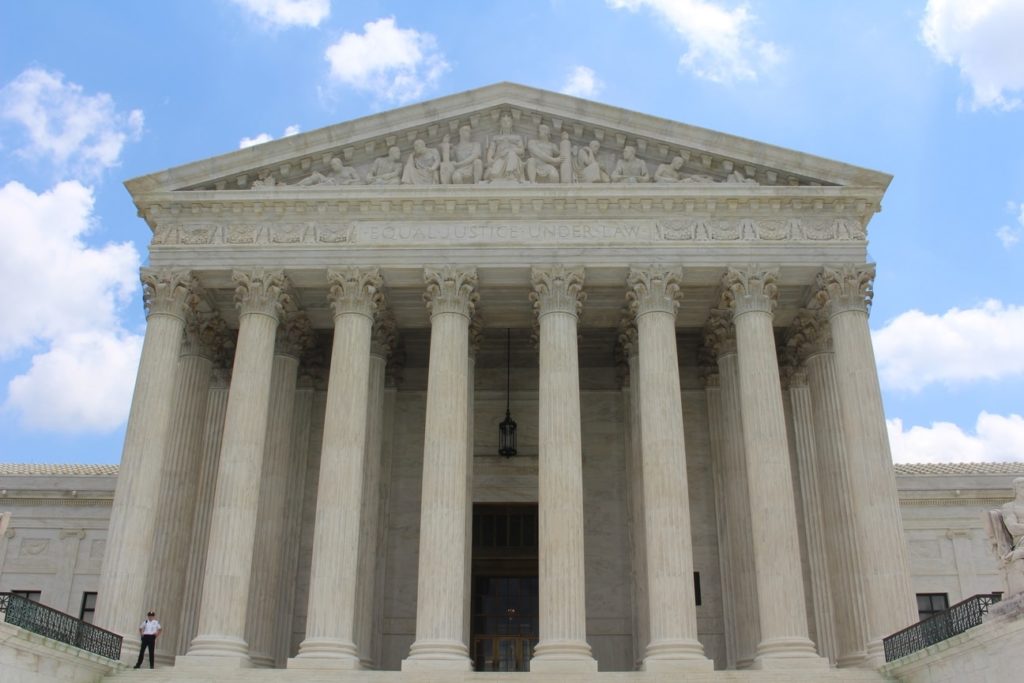There was a lot to agree with in the beginning of Michael Sean Winters’s recent essays on originalism and the Kavanaugh hearings, published by the National Catholic Reporter here and here. For example, he bemoans the now-ritualized refusals by Supreme Court nominees to answer most substantive questions and senators’ “gotcha questions.” But Winters also bemoans how Republican nominees regularly declare “I am an originalist.” Here, I disagree with him: I actually think this a cause for celebration, because it shows a return to fidelity to our Constitution.
In any case, the nominees’ invocations of originalism inspired Winters to investigate whether originalism, in its more sophisticated academic forms, is “intellectually wanting.” As examples, Winters cites and comments on two articles: one by Jeff Pojanowski and Kevin Walsh, and one by me. In my article, Originalism and the Aristotelian Tradition: Virtue’s Home in Originalism, I made two key moves. First, I argued that originalism’s transformation from original-intent originalism to original-meaning originalism opened it up to the criticism that originalism was incoherent on its own account because of its acknowledgment of judicial discretion. Originalism opened itself to judicial discretion because it recognized the existence of “constitutional construction” (which is when the original meaning does not provide an answer to a constitutional question), and because it accepted the continued viability of some nonoriginalist precedents. Second, I argued that virtue ethics provided the toolkit to allow originalists to acknowledge this discretion while, at the same time, enabling originalism to maintain its fidelity to the Constitution’s original meaning. For instance, after cataloguing the judicial virtues, I showed in particular how the virtues of justice-as-lawfulness, legal wisdom, and practical wisdom can help judges remain faithful to the Constitution when faced with nonoriginalist precedent. This article is part of my long-term project of crafting a natural law account of the U.S. Constitution.
As a scholar, I was delighted to see Winters engaging with my work. He thoughtfully summarized my summary of originalism’s evolution since the 1970s. Winters recounts the conventional story of how originalism first came on the scene in an intellectually self-conscious way as a response to the excesses of the Warren and Burger Courts, and that this critical stance caused originalists to focus on the text’s originally intended meaning. This first generation of originalists tied that claim to the argument that originalism constrained judges who, in turn, would respect the democratic choices of the American people expressed through their state and federal political branches. Along the way, though, my article comes in for some pretty heavy criticism: he calls it “crude,” “tenuous,” and devoid of “carefulness,” among other descriptions.
These criticisms are worth addressing because the Constitution is at the center of American political and legal life, so properly interpreting the Constitution is of crucial importance. Americans of all stripes invoke the Constitution to support their differing legal and political positions. Originalism’s capacity to provide a coherent method to answer these fundamental constitutional questions depends, as I described in my article, on whether it has successfully navigated its intellectual transformation. Winters argues it has not.
Start your day with Public Discourse
Sign up and get our daily essays sent straight to your inbox.Originalism and Virtue Ethics
Before moving to the meat of my response to Winters’s criticisms, it’s important to emphasize that Winters did not criticize my article’s two key moves. He did not dispute that originalism’s transformation opened it to judicial discretion, which threatened its integrity. He did not argue that virtue ethics could not enable originalism to maintain its integrity.
Instead, he focused his attention on one subpart of a supporting argument of my second key move. There I argued that adopting virtue ethics would have the additional benefit of making originalism more descriptively accurate. I did this because “fit” is a powerful argument in law. One’s claims must adequately fit the existing legal materials to count as a plausible description of those materials, and I argued that virtue ethics helped originalism better fit the American legal system. The last of the four ways in which virtue ethics will make originalism better fit American legal practice, I claimed, was that “originalism will better fit the Framers’ and Ratifiers’ plan of constitutional government which embraced their virtue-infused assumptions.”
Winters states that my “entire project rests on No. 4 being plausible.” That’s not true. One of the four fit arguments I made—what Winters calls No. 4, for example—could turn out not to be true, and virtue ethics-infused originalism could still adequately fit our constitutional practice. Moreover, my second key move in the article was to argue that virtue ethics helped originalism maintain its integrity. Even if my fit argument was wrong, my claim that virtue ethics assists originalism in maintaining its integrity would remain unscathed.
Winters then substantively criticized “No. 4.” He argued that I had to (and did) claim that virtue to the Framers and Ratifiers had “the same meaning” as “Thomistic philosophy.” That’s not true either. First, it is not the case that, for my claim to be true, the Framers’ and Ratifiers’ conception of virtue ethics must be “the same.” On the contrary, so long as the Framers’ and Ratifiers’ conception was the same as the one I employed in relevant ways, then my argument would be sound. For example, the Framers’ and Ratifiers’ conception of virtue ethics included the tenet that virtues may be gained (and lost). This is consistent with the conception I employed, and helps explain parts of the constitutional structure.
Virtue Ethics and the Founders
Second, I repeatedly acknowledged that there is widespread disagreement among historians about the Framers’ and Ratifiers’ commitment to and conception of virtue ethics, and cabined my argument accordingly. I stated:
Historical and legal scholarship, though differing on the degree to which virtue ethics was part of the intellectual climate during the Framing and Ratification, generally agrees with my modest claim that, among other intellectual commitments, the Framers and Ratifiers believed in virtue ethics and relied on that belief when constructing the Constitution.
I cited numerous sources supporting this claim and identifying disagreement among the historians, such as Professor Cass Sunstein’s work on the role of virtue in the Federalists’ pro-ratification arguments.
Winters faults me for citing James Madison’s famous maxim from Federalist 51: “If men were angels, no government would be necessary. If angels were to govern men, neither external nor internal controls on government would be necessary.” I agree with Winters’s point that Madison is wrong about the lack of need for angelic government. (Indeed, in an earlier article, I made this point explicit: “Government is not a necessary evil.”) Regardless, Madison’s dictum shows that he was concerned with the virtue—and vice—of potential government officers, and my argument was that the Framers took that concern into account when crafting the Constitution.
Winters also claims that I “believe[] virtue ethics can be introduced and possibly forge a conservative consensus.” Forging a conservative consensus is not one of the article’s stated goals, it does not follow from the article’s arguments, nor was it one of my subjective goals in writing the article. Indeed, based on my research into the original meaning, there are facets of the original meaning with which most American conservatives would disagree.
What Is Originalism?
Winters begins and ends his critique of my article by claiming that my conception of originalism is not originalism. “Originalism as understood today in law reviews, then, is not as originalist as it pretended to be in the 1970s and as it still purports to be in the public square.” That’s not true.
Originalism today, as described by Professor Larry Solum in his testimony at the Gorsuch confirmation hearings, is committed to two propositions. First, the meaning of the Constitution’s text was fixed when it was ratified. Second, judges should follow this original meaning. This fits the conception of originalism I advanced in my article, it fits Judge Bork’s earlier conception, it fits the views of nearly all contemporary originalist scholars, and it fits Judge Kavanaugh’s remarks.
In the end, I think Winters and I can at least find common ground in one of his aphorisms: “Happy the man who has enough time on his hands to get involved in these kind of intramural academic debates.”













